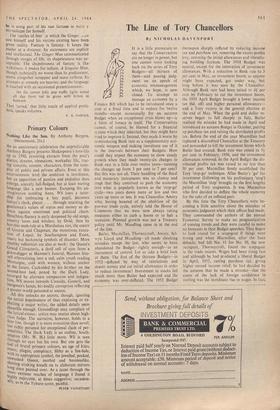Primary Colours
Nothing Like the Sun. By Anthony Burgess. (Heinemann, 21s.) As an anniversary celebration the unpredictable Anthony Burgess presents Shakespeare's love-life UP to 1590, inventing extracts from the poet's diaries, dreams, obsessions, workaday life, trac- ing conceits, sonnets, characters, from the inter- Play of public and private affairs. Even at this entertainment level the ambition is inordinate, but an apparition of passion and prejudice does emerge, scarcely full-fledged, but at least waving language like a new banner. Escaping his un- imaginative scolding Anne, WS loses a tutor- ,ship for embracing a boy pupil, ,becomes lawyer's clerk, player . . . through retaining the gentleman's values of status and money as de- fence against emotional and political chaos. Breathless fluency is early deepened by old songs, country loves and witches; by Ovid; then by horrible mob-rule at a Marshalsea riot, the sneers of Greene and Chapman, the monstrous execu- tion of Lopez; by Southampton and Essex, Manic but beckoning symbols of disorder. More stealthy influences are also at work : the Queen's Grand Climacteric, a droll roll of eyes from' a grave-digger at Hamnet's funeral, Hamnet him- self etherealising into a sad, calm youth reading Montaigne, cold with women, without anchor in the future. Cuckolded by his brother on the second-best bed, poxed by the Dark Lady, scourged by alternate compassion and indigna- lien, WS moves towards Cressida, Goneril, and hangman's hands, his bodily corruption reflecting a greater world poisoned at source. All this unlocks no secrets, though, ignoring the initial hopelessness of thus exploring or ex- Plniting a major writer, the added details seem Plausible enough. Groundlings may complain of the lyrical excess: critics may mutter about high- class fudge. The narrative, however, holds to a firm line, though it is more evocation than novel; too richly personal for exceptional clash of per- sonalities. The Dark Lady is an outline, South- anlPton (Mr. W. H.), little more. WS is seen through no eyes but his own. But one gets the feel of brutal primary colours, an age of kites, music, plague, conspiracy, filthy as a fox-hole, with its appropriate symbol, the jewelled, pocked, unwashed Queen, morbid and businesslike, long stinking breath on to elaborate mirrors t°ng since painted over. As a jaunt through the .more extreme reaches' of language I found it _11;FhlY enjoyable, at times suggestive; occasion- dill', as in the Tyburn scene, painful.
PETER VANSITTART






































 Previous page
Previous page